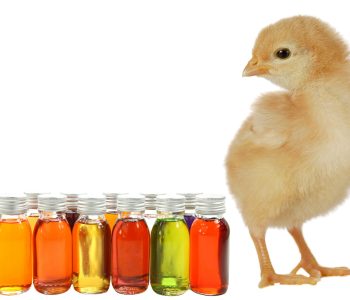Essential oil nanoemulsions are more effective at improving broiler growth performance and health status, compared to the use of essential oils alone.
Essential oils (EO) can be used as an alternative to antibiotics within poultry production, due to their antimicrobial properties which benefit animal health and performance.
| However, essential oils are mainly composed of lipophilic and aromatic bioactive compounds which limits their use to a certain extent due to their low solubility and stability. |
Nanoemulsions are a potential approach, for the effective administration of essential oils in poultry farming.
Essential oil nanoemulsions are carrier systems that can be used to overcome the volatile nature of essential oils (EOs) which limits their application. The encapsulation of EOs through nanoemulsions is an innovative technology that can help:
- Overcome factors that limit the use of EOs
- Preserve therapeutic efficacy by reducing volatility
- Increase stability and solubility
Due to their larger surface area, nanoemulsions stabilize and enhance the antimicrobial effects of oils in aqueous solutions.
Objective of the study
To make an in vivo assessment of the growth promoting effects of thymol and thymol essential oil nanoemulsion, while also determining their protective capacity against infections caused by Salmonella Typhimurium.
Materials and methods
2400 one day-old chicks were randomly divided into eight groups
- Negative control ⇒ Received a control diet without thymol or thymol nanoemulsion and were not challenged
- Positive control ⇒ They received a control diet without thymol additives, but were challenged at 23 days of age with a S. Typhimurium strain
- Birds from the thymol and thymol nanoemulsion groups ⇒ received a control diet supplemented with thymol or thymol nanoemulsion at concentrations of 0.25, 0.5 and 1% and were also challenged.
All experimental birds from the positive control groups, thymol and thymol nanoemulsion were challenged with an inoculum dose (1 mL of 3×106 CFU/bird) of S. Typhimurium. The negative control group was the only group that was not exposed to the S. Typhimurium strain.
Discussion
Growth performance
The potential mechanism through which essential oils impact growth performance can be attributed to:
- Increased feed digestibility due to stimulation of endogenous enzymes
- Regulation of the intestinal microbiome.
It is also known that phytogenic compounds have the capacity to regulate gene expression profiles of the ileal mucosa and stimulate digestive secretions to improve nutrient digestibility.
| Dietary thyme oil has been shown to increase digestive enzymes and improve nutrient utilization in broilers. |
The enhancing role of thymol nanoemulsion in broiler performance could be explained by an improved bioavailability and bioactivity of thymol
⇒ Thymol nanoemulsions allow a deeper tissue penetration and facilitate cellular uptake within the gastrointestinal tract. This in turn, leads to a more efficient gene regulation of digestive enzymes.
Intestinal integrity
mRNA expression of digestive enzyme genes was upregulated in response to dietary inclusion of higher thymol or thymol nanoemulsion levels, compared to the negative group before infection and the positive group after infection. The most significant effects were reported for the thymol nanoemulsion group.
In addition, the group that was supplemented with 1% thymol nanoemulsion exhibited the most significant increase in mRNA expression for narrow-junction protein genes. A higher concentration (1%) of thymol nanoemulsion greatly increased the genes encoding occludin, zone occludens-1, claudins -1, JAM, MUC-2 and FABP2, controlling barrier functions even after experimental infection, and was better than thymol.
| Therefore, dietary supplementation with thymol nanoemulsion was shown to improve intestinal integrity and reinforce mucosal barrier function. |
Protection against Salmonella Typhimurium
Salmonella Typhimurium is a common enteropathogenic bacteria that causes serious economic losses within the poultry sector. In addition to these economic losses, reducing Salmonella populations in chickens could potentially reduce the contamination of meat and its by-products.
14 days post infection, 1% thymol and 0.5% and 1% thymol nanoemulsion supplementation significantly reduced Salmonella counts compared to the positive control group.
The most striking result was that of 1% thymol nanoemulsion, which reduced Salmonella counts by a significant measure of 2.27 log10 CFU/g.
Conclusion
Administration of 1% thymol essential oil nanoemulsion produced positive transcriptional modifications in broiler digestive enzymes.
The integrity of the intestinal barrier (Tight Junction = TJ) was positively maintained, which was evidenced by the upregulation of the MUC-2 and IgA genes and the downregulation of the IL-2 and IL-6 genes, suggesting a suppression of the inflammatory reaction induced by S. Typhimurium.
| TJ = Tight Junctions form the continuous intercellular barrier between epithelial cells, which is necessary for separating tissue spaces and regulating the selective movement of solutes through the epithelium. |
